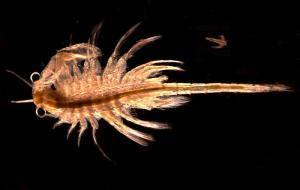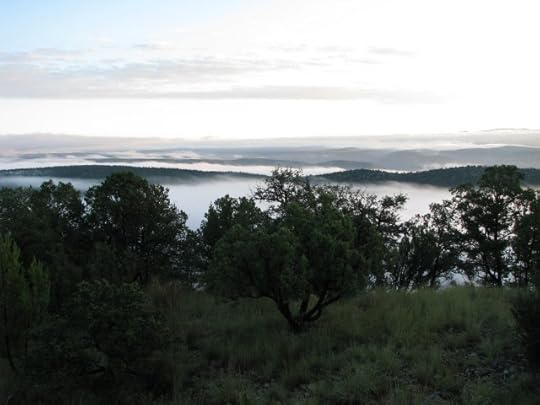Kate Rauner's Blog, page 93
October 4, 2014
Space Weather and Solophobia
 Have you noticed reports from time to time (for example, here) warning of “huge expulsions of magnetic field and plasma” from the sun, perhaps accompanied by dire predictions that satellites will be destroyed, the electrical grid disrupted, or doomsday is upon us? I hope you have also noticed we are still alive. Predictions of the apocalypse are common and many people take them seriously. Some scenarios are crazy, and it’s not just the sun that frightens people – remember the Nibiru or Planet X 2012 Doomsday scare? But “fear of the sun” probably deserves its own “phobia” term – maybe solophobia.
Have you noticed reports from time to time (for example, here) warning of “huge expulsions of magnetic field and plasma” from the sun, perhaps accompanied by dire predictions that satellites will be destroyed, the electrical grid disrupted, or doomsday is upon us? I hope you have also noticed we are still alive. Predictions of the apocalypse are common and many people take them seriously. Some scenarios are crazy, and it’s not just the sun that frightens people – remember the Nibiru or Planet X 2012 Doomsday scare? But “fear of the sun” probably deserves its own “phobia” term – maybe solophobia.
If you are interested in solar activity, you’ll find many scientists share your interest. I found a nice site to monitor the sun’s activity: http://www.swpc.noaa.gov/SWN/index.html
Scroll down to the gages showing the sun’s magnetic field, solar wind speed, and dynamic pressure. Without studying these terms, you can watch the gauge move from green to yellow to red. Relax when everything is green, and take comfort from the occasional excursion into the red: we’re still here. Click around the site and learn more about space weather.
I don’t mean to disparage reasonable preparation. From earthquakes to hurricanes, there are disasters that can leave you off the grid and beyond help for days. I live in southwest New Mexico on a ridge surrounded by dry forest. Wildfires are common and any fire around me is likely to run straight up the slopes to my house. I keep my home firewise and have a “bug out” list pinned to my bulletin board – a prioritized list of things to do or toss in the car if I need to evacuate. Everyone should be ready to take care of themselves in an emergency.
When you make your own emergency plans, consider two risks. The danger from whatever event you prepare for, and the opportunities you’ll lose by living in a bunker.








Space Weather and Solphobia
 Have you noticed reports from time to time (for example, here) warning of “huge expulsions of magnetic field and plasma” from the sun, perhaps accompanied by dire predictions that satellites will be destroyed, the electrical grid disrupted, or doomsday is upon us? I hope you have also noticed we are still alive. Predictions of the apocalypse are common and many people take them seriously. Some scenarios are crazy, and it’s not just the sun that frightens people – remember the Nibiru or Planet X 2012 Doomsday scare? But “fear of the sun” probably deserves its own “phobia” term – maybe solphobia.
Have you noticed reports from time to time (for example, here) warning of “huge expulsions of magnetic field and plasma” from the sun, perhaps accompanied by dire predictions that satellites will be destroyed, the electrical grid disrupted, or doomsday is upon us? I hope you have also noticed we are still alive. Predictions of the apocalypse are common and many people take them seriously. Some scenarios are crazy, and it’s not just the sun that frightens people – remember the Nibiru or Planet X 2012 Doomsday scare? But “fear of the sun” probably deserves its own “phobia” term – maybe solphobia.
If you are interested in solar activity, you’ll find many scientists share your interest. I found a nice site to monitor the sun’s activity: http://www.swpc.noaa.gov/SWN/index.html
Scroll down to the gages showing the sun’s magnetic field, solar wind speed, and dynamic pressure. Without studying these terms, you can watch the gage move from green to yellow to red. Relax when everything is green, and take comfort from the occasional excursion into the red: we’re still here. Click around the site and learn more about space weather.
I don’t mean to disparage reasonable preparation. From earthquakes to hurricanes, there are disasters that can leave you off the grid and beyond help for days. I live in southwest New Mexico on a ridge surrounded by dry forest. Wildfires are common and any fire around me is likely to run straight up the slopes to my house. I keep my home firewise and have a “bug out” list pinned to my bulletin board – a prioritized list of things to do or toss in the car if I need to evacuate. Everyone should be ready to take care of themselves in an emergency.
When you make your own emergency plans, consider two risks. The danger from whatever event you prepare for, and the opportunities you’ll lose by living in a bunker.








October 1, 2014
Ocean Current Helmsmen – a poem by Kate Rauner

Sea monkeys – a favorite of comic book ads
The fairy shrimp I netted
In thickly stagnant ponds
Have cousins in the oceans
And the oceans may respond.
Once thought as floating helpless,
Adrift at waters’ whim,
It seems they may create
Currents as they swim.
Swarms of tiny sea-monkeys,
Each with its own motility,
Make swirls and eddies as they swim;
Fluidic instability.
Great herds of plankton could, therefore,
Mix oceans as they swim,
Effect the climate of the world
With their lacey limbs.
This effect needs to be confirmed, but is just too poetic a possibility to ignore. I also couldn’t resist slipping in the fairy shrimp – as a kid, I netted fairy shrimp in a stagnant pond choked with leaves and algae. The shrimp had to swim up to the surface through black water for a little sun. I’d watch them swim in a jar for a while, and then dump them back since I didn’t know what to feed them. I never thought what a billion billion of them might accomplish.








September 27, 2014
What Makes a Novel Successful Is In the Mind of the Reader
 I read Never Let Me Go by Kazuo Ishiguro with a purpose – I want to understand what makes a science fiction novel popular and commercially successful. According to the cover, Time called it “the best novel of the decade.” Over a thousand reviews on Amazon average to four stars. So I read the book trying to pay attention and learn.
I read Never Let Me Go by Kazuo Ishiguro with a purpose – I want to understand what makes a science fiction novel popular and commercially successful. According to the cover, Time called it “the best novel of the decade.” Over a thousand reviews on Amazon average to four stars. So I read the book trying to pay attention and learn.
The book opens with a data dump – something all writing advice says you must not do. We do learn a titillating detail: that the characters are “donating” their organs until they “complete.” It don’t think this next sentence is much of a SPOILER – it seemed obvious in the first few pages that these young, healthy people “donate” organs until they are killed. Later we learn they are clones and a callous world thinks raising children to produce adult-sized organs is acceptable.
Despite the science fiction premise, the book is about the relationships of teenage boarding school kids – who likes whom, who bullies whom, and (as they grow) who has sex (not graphic). The narrator tells the story as a memoir and frequently interrupts herself to explain things. Although the story covers their teens and 20s, the characters sound pretty much the same throughout the book. They seem to have little initiative, and though they are raised to accept being “donors”, no particular indoctrination justifies their passive attitudes. It was hard for me to identify with any of them. Only one character was upset at having his organs harvested.
The premise is flawed for me. I will accept a fictional world where “they” raise others to provide organs, but they harvest the organs in four separate surgeries with lengthy and presumably expensive recoveries between. That makes no sense – it would be more efficient for a callous society to harvest all the organs at once. But not as tragic, I suppose, for the characters.
The Big Discovery near the end of the book occurs when the two main characters sit in arm chairs and listen to a third character explain things (while inexplicably worrying about men moving a piece of furniture in the next room). What happened to that cornerstone piece of writing advice, “show, don’t tell”?
I can’t explain this book’s appeal, but I can quote from those who love it (from Amazon):
“Kazuo Ishiguro’s quietly disturbing novel aims to make us question the ethics of science”
“richly textured description of the relationships”
“the author not only conjures the question of the meaning of life, he asks us to contemplate the tragedy of wasted lives.”
“a transcendent novel, an astonishingly powerful work of literature”
“This novel works beautifully on multiple levels, giving it a quality that kept me thinking about its plot, characters and themes long after I finished its final page”
“The horror of Never Let Me Go is that the [characters] know almost exactly what lies beyond the curtain and they continue to look and participate in the pageantry of life anyway. How human of them”
“The book is a beautiful meditation… I must say that I am baffled at all the negative reviews” [About a third of the reviews are 3, 2, or 1 star]
I don’t yet know what I’ve learned from the book – maybe that general literary fiction has a wider appeal than the genre of science fiction (one five-star review said “the story didn’t feel like science fiction” and I agree), that teenage angst is not as interesting to me as it is to many others, and that what writers really need to do to be successful is find “their” readers.








September 24, 2014
Fog in the Black Range – Haiku by Kate Rauner
September 19, 2014
Long, Long, Long Lost Brothers
 Thirty years ago, Danish scientists collected small, floating marine creatures off an Australian coast. Among those specimens, they have now announced, are “two new species of what they call Dendrogramma in a study published in the journal PLOS ONE.” These new species are so strange they may have last shared a common ancestor with humans 600 million years ago. They may represent a new phylum.
Thirty years ago, Danish scientists collected small, floating marine creatures off an Australian coast. Among those specimens, they have now announced, are “two new species of what they call Dendrogramma in a study published in the journal PLOS ONE.” These new species are so strange they may have last shared a common ancestor with humans 600 million years ago. They may represent a new phylum.
Long before modern science, philosophers separated life into the Kingdoms of Animal and Plant. In Today’s taxonomy, Kingdoms are divided into Phyla; for example, Chordata, the phylum that unites you and me with sea squirts. A phylum is a very basic classification. A new phylum is an extraordinary claim and requires extraordinary scrutiny.
The Dendrogrammas are weird little guys, but aren’t likely to star in their own SyFy monster movie. They look like odd jellyfish. The Kingdoms of Animals and Plants got all the big, flashy species, at least from a human point of view. Once microscopes allowed a more detailed examination, three or four groups of microbes (the science is still developing) were so different they were classified in their own Kingdoms, and they won’t get their own monster movie, either. But we still live on the Planet of Bacteria. We, who have dominion over the beasts of the field, should contemplate our small brethren who out-number us, out-weigh us, and may out-survive us.








September 17, 2014
Volcano in Slow Motion – a poem by Kate Rauner

The Goddess Pele by Arthur Johnsen for Hawai’i Volcanoes National Park
Evacuate! Emergency!
But there’s no rush for those who flee
This lava flowing to the sea
Since nineteen hundred eighty three,
Its edge is marked by burning trees.
No one will die, thankfully.
Walk away from this calamity.
The Goddess Pele’s Hawaii’s
Built for herself, not you or me.
There seem to be a lot of volcano stories this year, including Kilauea’s Pu’O O’O crater venting lava towards homes – for example: LiveScience.com








September 13, 2014
Like Houdini, James Randi Entertains and Debunks Frauds

Randi is famous for debunking psychic frauds who bend flatware
I love magic – real magic done by slight of hand and misdirection, not camera tricks. There have been several TV shows recently that revealed some of the tricks of the magic trade. Penn & Teller are well known for this, and for their dislike of bullshit.
Now there’s a documentary coming out about the Amazing (James) Randi, a venerable magician who, like the famous magician Houdini, has been debunking psychics and frauds for decades. There’s a challenge on his site randi.org offering a million dollars to anyone who can prove something paranormal. Randi’s team has evaluated claims of psychic powers, ESP, dowsing, magnetic humans, astrology, faith healing, and more. He says that scientists are ill-prepared to evaluate such claims – you need a magician to catch a magician; or a well-meaning person who has fooled themselves. As Richard Feynman said, “the first principle is that you must not fool yourself and you are the easiest person to fool.” So far no one has claimed the prize, but it will truly be amazing if someone does – a breath-taking surprise to science. I’d love to see that, but sadly, so far, the paranormal is home to superstition.

James Randi
It may be harmless entertainment to read your horoscope every day, but superstition can cause harm, can even kill. What intentional frauds do is immoral, sometimes illegal, so I applaud Randi. But I do disagree with him on one point. He says, people don’t really want to know how a magic trick is done, it bums them out. Not me – I am even more amazed when I see how I have been tricked (I’m always tricked – I can never figure out magic), and still enjoy seeing the trick again. I can love magic, science fiction, and fantasy, and yet live in the real world. Reality, after all, is pretty amazing. Besides, no matter how hard you believe, reality always wins.
I don’t see the release details yet, but watch for the documentary. StrictlyDocs.com
BTW – Penn and Teller have a new TV show on the SyFy channel: Wizard Wars which promises to take “viewers behind the scenes of magic by challenging a new team of magicians each week to create the most jaw-dropping illusions.” The episodes I’ve seen so far make me realize that magicians spend a lot of time perfecting their routines – and the show doesn’t allow them that time. But I’ll keep watching.

Penn & Teller








September 10, 2014
You Are a Zoo – a poem by Kate Rauner
You are home to millions
More microbe cells than yours.
A human microbiome,
The normal flora forms.
You grow your unique garden
In skin and gut and hair.
The most obsessed collector
Simply can’t compare.
Ten thousand species strong,
Four pounds of life inside.
They crowd out nasty pathogens,
Even detoxify.
Fun microbe fact: the average healthy adult has 10 times as many microbial cells as human cells. There’s lots of information on harmless and symbiotic microbes that we humans are healthier for housing. Try LiveScience.com or blog.ted.com
Thanks to Clker.com for the illustrations.








September 6, 2014
Can Someone With Low EQ Write?
 EQ is Emotional Quotient, or Emotional Intelligence: “the ability to monitor one’s own and other people’s emotions, to discriminate between different emotions and label them appropriately and to use emotional information to guide thinking and behavior.”
EQ is Emotional Quotient, or Emotional Intelligence: “the ability to monitor one’s own and other people’s emotions, to discriminate between different emotions and label them appropriately and to use emotional information to guide thinking and behavior.”
That’s a definition meant for me. Women are supposed to have lots of EQ – but not all of us do.
I like to think of myself as a goal oriented team player, but not everyone sees me that way. I can be startled when someone is upset with me – I wasn’t feeling upset or angry. My college room mate once didn’t speak to me for two weeks and I never did understand why.
Low EQ hasn’t stopped me from having a good life. I became an engineer and found friends just as pitiful in the EQ department as I am. I married an engineer. I was lured into writing fiction by a friend – I love to read, so it should be fun to write, right?
I find a lot of entertainment to be overwrought, which probably is part of why science fiction attracts me. It tends to require that I “integrate emotion to facilitate thought” less.

Bernadette on “The Big Bang Theory.” Somebody loves a nerd.
That doesn’t mean I’m a robot. I “feel” my characters, and I want to share that feeling. But the engineer in me believes in learning, in analysis. So I like this post at http://critters.org/rel/rel.ht:
“Better” SF stories pay more attention to characters’ inter-personal relationships [than ordinary science fiction].”
The post scores large numbers of books on the “interpersonal relationships” of the characters. Out of a possible 100 perfect score that makes Oprah fans cry:
Science fiction/fantasy overall scores an average of 22.5.
Award winning/famous science fiction scores 30
Ordinary science fiction scores 15
For comparison, non-genre mainstream fiction scores 55
The scoring is explained, there’s a link to all the book titles and scores, and even a discussion of statistics. Hot damn!
(I scored my first novel and it was a bit above average. But maybe scoring my own book is circular.)
What do you think? What’s a low EQ author to do?
Oh, wait – hang on – let me add…
(That’s supposed to be ironic. Did I get it? Did I?)





















